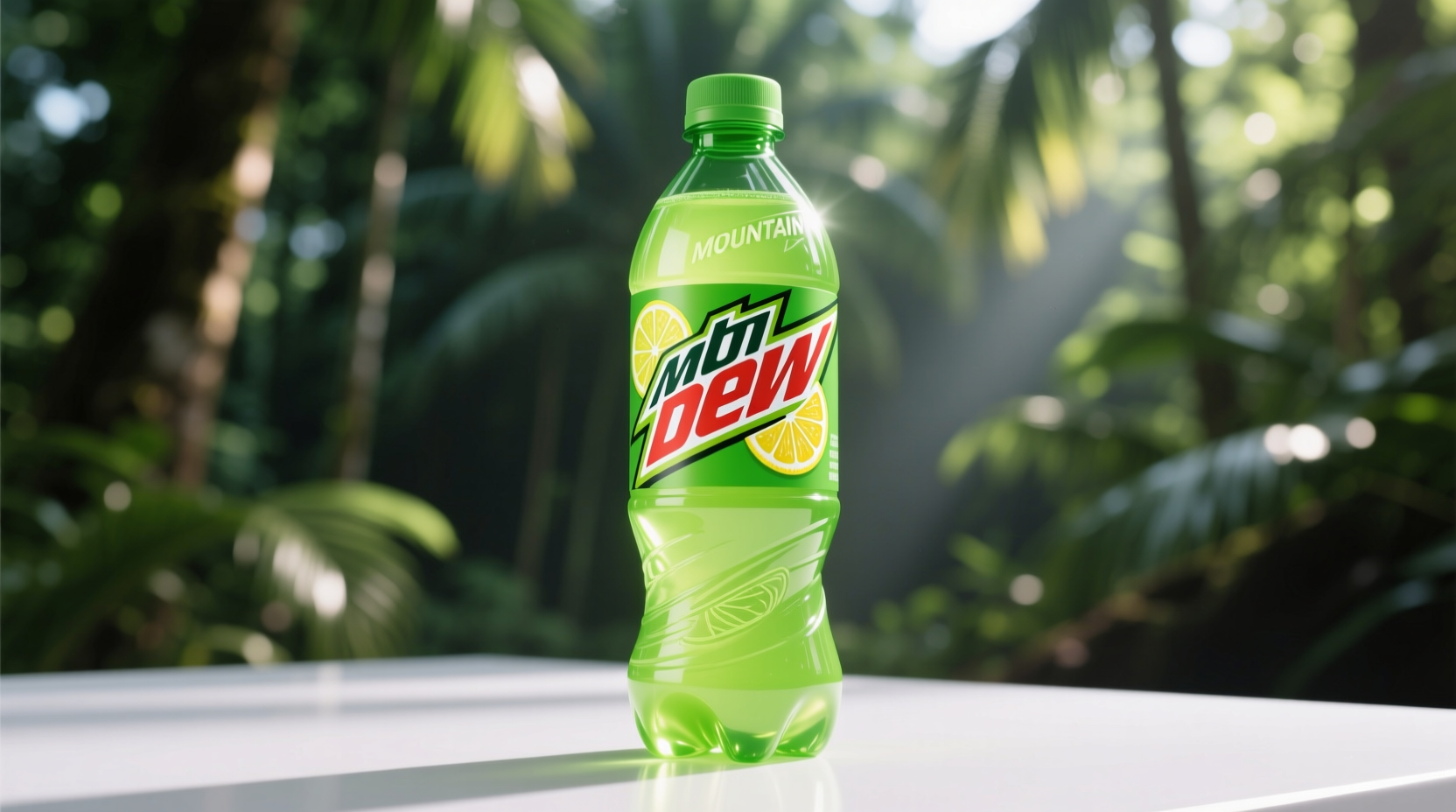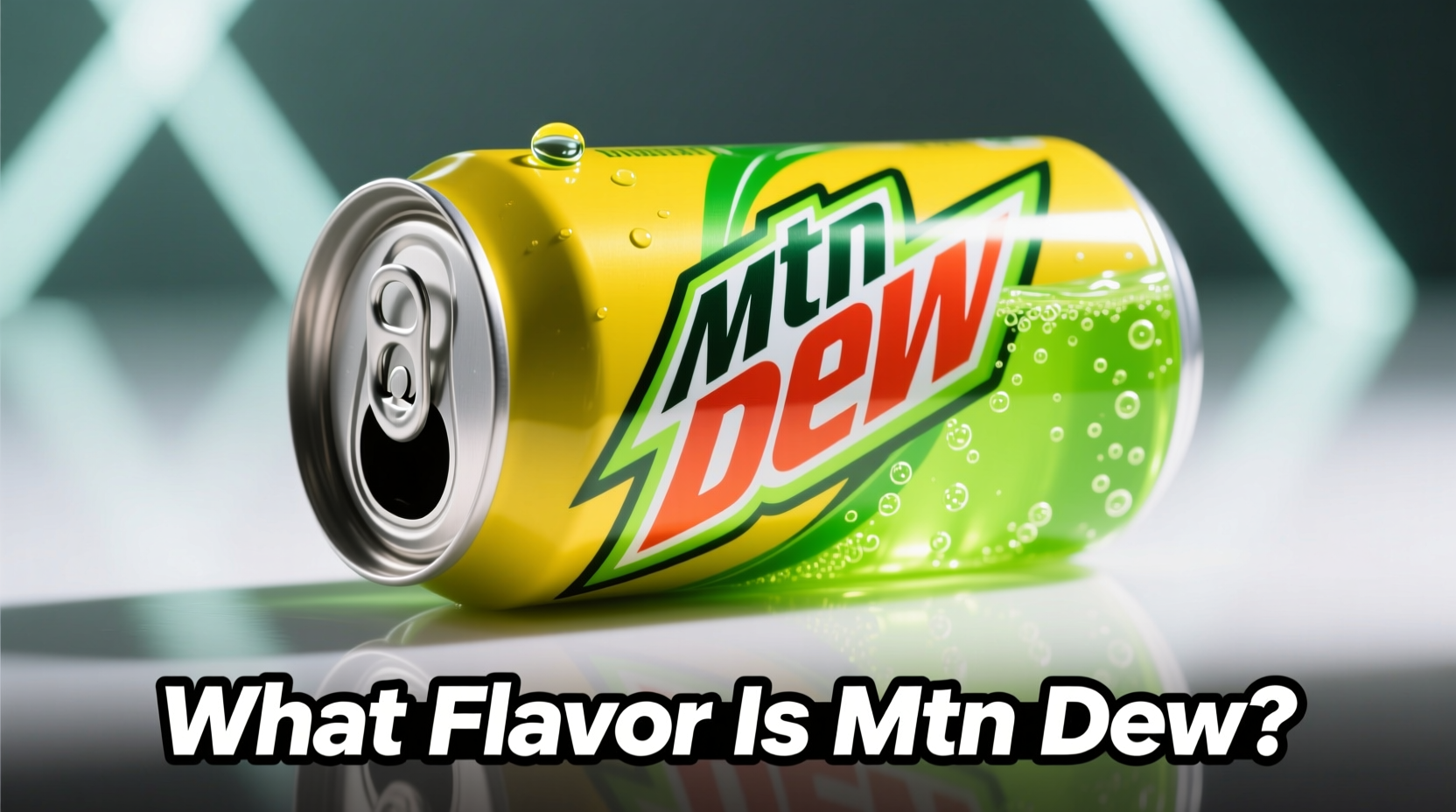Mountain Dew's signature flavor is a distinctive citrus fusion primarily composed of orange, lemon, and lime notes, with additional tropical undertones that create its unique taste profile. This proprietary blend has remained consistent since the beverage's national introduction in 1964, though minor adjustments have been made over time to enhance its refreshing character.
The Citrus Fusion That Defines Mountain Dew
When you take your first sip of Mountain Dew, you're experiencing a carefully crafted citrus symphony. Unlike many other soft drinks that focus on a single citrus flavor, Mountain Dew combines multiple citrus elements to create something entirely unique. The predominant notes you'll detect include:
- Orange - Providing the sweet, rounded base note
- Lemon - Adding bright acidity and tanginess
- Lime - Contributing a sharper, more complex citrus element
- Tropical undertones - Subtle hints of other citrus varieties that give depth
This specific combination creates what PepsiCo describes as a "citrus punch" that's simultaneously sweet, tart, and refreshing. The balance between these elements is what makes Mountain Dew instantly recognizable to consumers worldwide.
How Mountain Dew's Flavor Evolved Over Time
Understanding what flavor Mountain Dew is requires examining its historical development. The beverage wasn't always the citrus fusion we know today:
| Time Period | Flavor Profile | Key Changes |
|---|---|---|
| 1940s-1950s | Raindrop Dew | Originally created as a mixer for whiskey with a different citrus profile |
| 1961 | Mountain Dew | Reformulated specifically as a standalone beverage with enhanced citrus notes |
| 1970s-1980s | Classic Formula | Introduction of high-fructose corn syrup while maintaining citrus balance |
| 2010s-Present | Modern Formula | Minor adjustments for cleaner taste while preserving core citrus fusion |
The original formula was developed by Tennessee bottlers Barney and Ally Hartman in 1940 as a whiskey mixer. When PepsiCo acquired the brand in 1964, they refined the citrus blend to stand alone as a soft drink, creating the distinctive flavor profile that would become iconic.
Breaking Down the Flavor Components
While the exact Mountain Dew flavor formula remains a closely guarded trade secret, food scientists and flavor experts have analyzed its composition. The distinctive taste comes from several key elements working in harmony:
Natural and Artificial Flavorings
The "natural and artificial flavorings" listed in Mountain Dew's ingredients constitute approximately 2% of the beverage but are responsible for its signature taste. According to flavor chemistry analysis from the U.S. Food and Drug Administration, these components typically include:
- Citrus oils extracted from orange, lemon, and lime peels
- Synthetic compounds that enhance specific flavor notes
- Esther compounds that create the distinctive "tang"
The Role of Citric Acid
Citric acid serves a dual purpose in Mountain Dew. Beyond acting as a preservative, it significantly impacts the flavor profile by:
- Enhancing the perception of citrus notes
- Creating the characteristic tartness that balances the sweetness
- Providing a clean finish that prevents the drink from tasting cloying
How Mountain Dew Compares to Other Citrus Sodas
Understanding what flavor Mountain Dew is requires comparing it to other popular citrus beverages. While many sodas claim citrus profiles, Mountain Dew's specific blend creates a distinctive experience:
- vs. Sprite/Lemon-Lime Sodas: Mountain Dew has a more complex profile with stronger orange notes and less emphasis on pure lemon-lime
- vs. Orange Sodas: While containing orange elements, Mountain Dew is less sweet and has more pronounced tartness from lemon and lime
- vs. Citrus Energy Drinks: Mountain Dew's flavor is generally smoother with less artificial aftertaste compared to many energy drinks

Regional Variations and Limited Edition Flavors
While the original Mountain Dew flavor remains consistent across most markets, PepsiCo has introduced numerous variations that build upon the core citrus foundation:
- Mountain Dew Code Red - Adds cherry flavor to the citrus base
- Mountain Dew Voltage - Features tropical fruit notes while maintaining citrus elements
- Mountain Dew LiveWire - An experimental berry-citrus fusion
- Mountain Dew Baja Blast - Originally created for Taco Bell, adds tropical notes to the classic formula
Despite these variations, the original Mountain Dew flavor has maintained its position as the flagship product, with consumers consistently returning to the classic citrus fusion that defined the brand.
Describing Mountain Dew's Flavor to Someone Who's Never Tried It
If you're trying to explain what flavor Mountain Dew is to someone unfamiliar with the beverage, consider these descriptive approaches:
- Comparative description: "Imagine a blend of orange soda and lemon-lime soda with a distinctive tangy finish that's more complex than either alone."
- Sensory breakdown: "Starts with sweet orange notes, transitions to bright lemon tang, finishes with a subtle lime sharpness, all balanced by a unique citrus 'punch' that lingers."
- Everyday analogy: "Think of the most refreshing parts of orange juice, lemonade, and limeade combined into one carbonated beverage with a distinctive sweet-tart balance."
Food scientists at the Institute of Food Technologists note that Mountain Dew's flavor profile activates multiple taste receptors simultaneously, creating what they describe as a "flavor burst" that distinguishes it from simpler citrus sodas.
Why Mountain Dew's Flavor Stands the Test of Time
Several factors contribute to Mountain Dew's enduring flavor appeal:
- Balance - The precise ratio of sweet to tart creates a satisfying flavor experience
- Complexity - Multiple citrus notes provide depth that simpler sodas lack
- Refreshing quality - The tart elements make it particularly thirst-quenching
- Distinctiveness - The specific blend makes it instantly recognizable
According to market research from Beverage Marketing Corporation, Mountain Dew's flavor profile consistently ranks high in consumer preference tests for citrus soft drinks, particularly among consumers seeking a more complex alternative to single-note citrus beverages.











 浙公网安备
33010002000092号
浙公网安备
33010002000092号 浙B2-20120091-4
浙B2-20120091-4